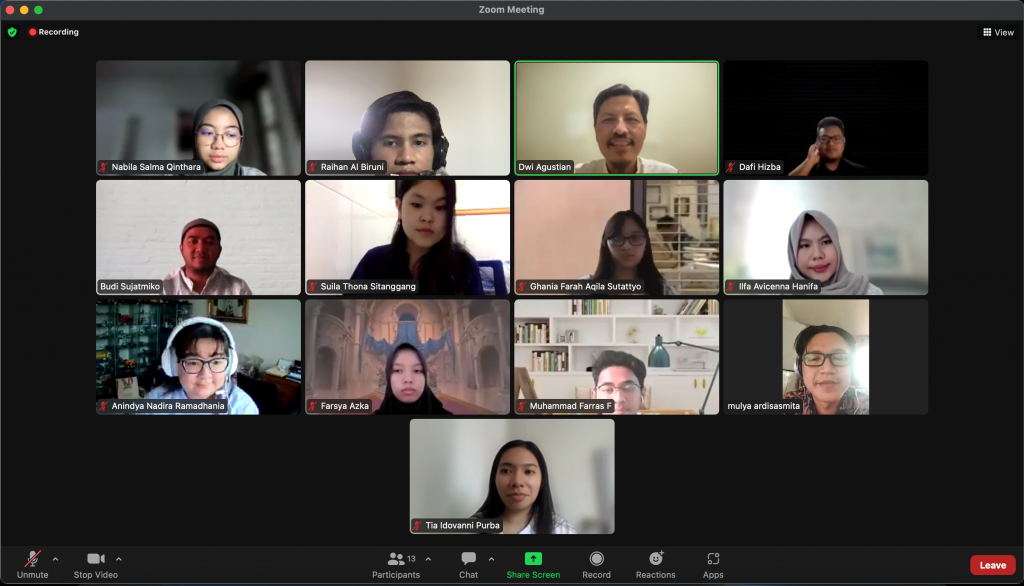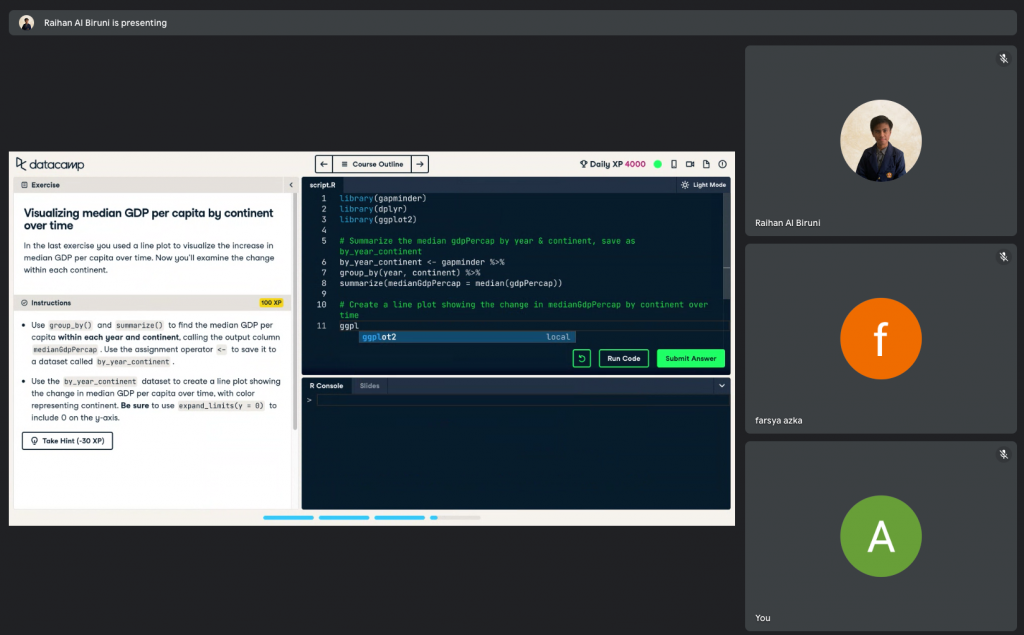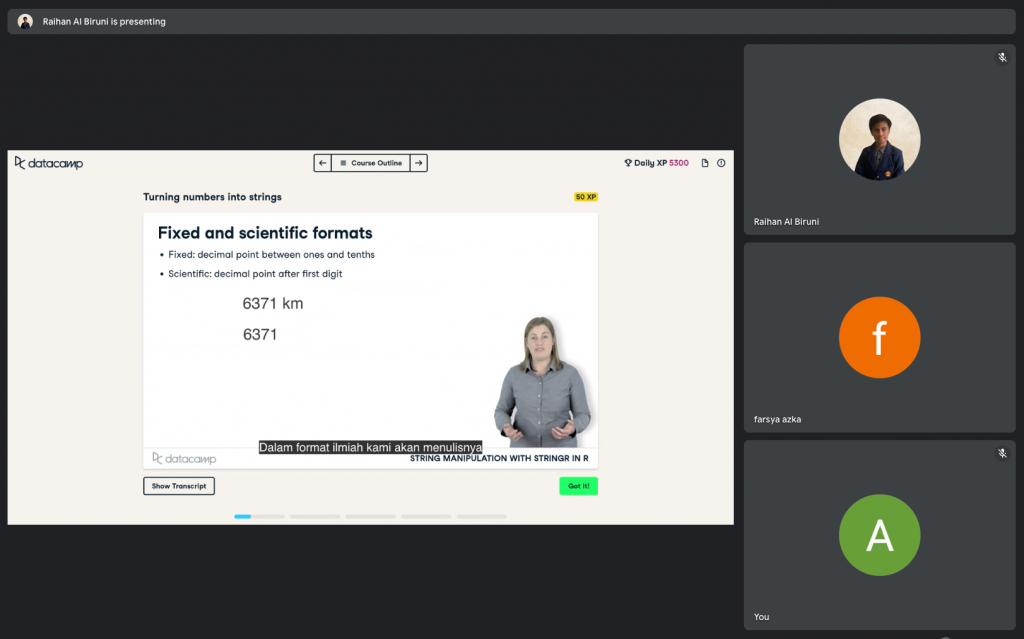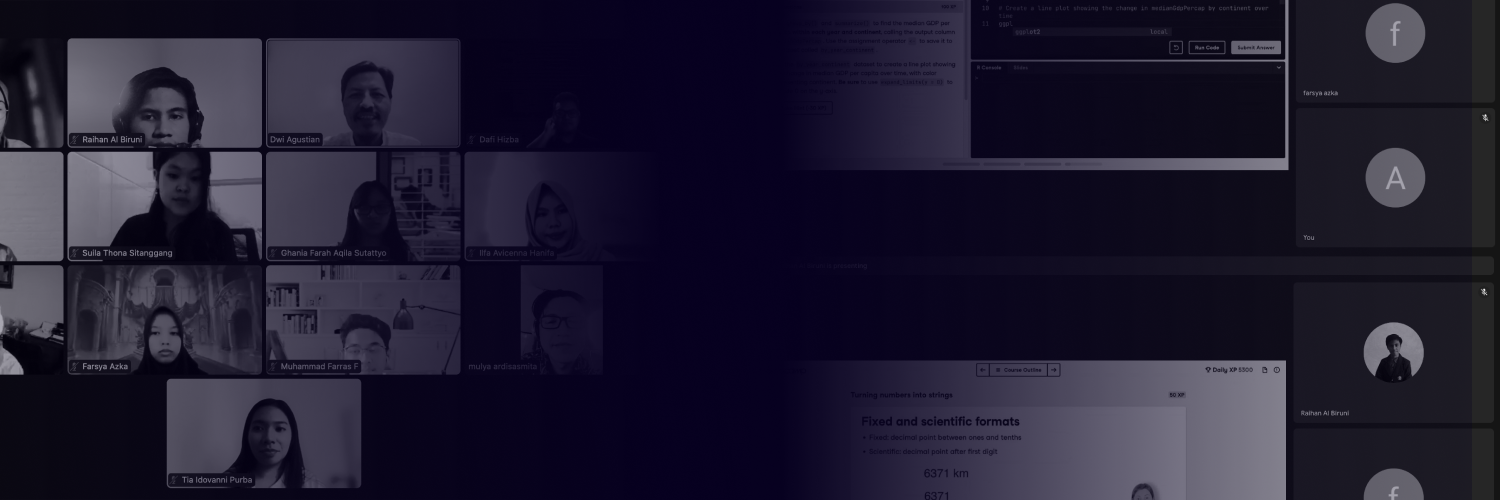In the second week, we only held one meeting with the supervisor doctors as a weekly discussion, which is on Wednesday, August 10, 2022. However, in addition to the weekly discussion, I did a meeting with my DataCamp group to discuss learning materials in the DataCamp platform. The meeting was held on Monday (08-08-2022), Thursday (11-08-2022), and Friday (12-08-2022).
Monday: DataCamp – Introduction to R
On the first day of the second week, I started to study the material on the DataCamp platform with Farsya and Anin as group 3.
There are several courses/classes in DataCamp. The courses have several chapters to learn. Since this meeting was our first day using DataCamp, we decided to learn the basic material first, which is a course entitled “Introduction to R”. The course consists of basic materials related to the R program which are widely used to analyze data. The materials are divided into six main chapters:
- intro to basics;
- vectors;
- matrices;
- factors;
- data frames; and
- lists.
The three of us were able to complete the course within 1.5 hours by working alternately while sharing screens in the Zoom Meeting room so that everyone could try and watch the course. We think that the course is very important for beginners like us to learn because it makes it easier to learn the other courses that are quite complicated. To find out more clearly about the material on the course, you can see it here.
Rabu: Diskusi Mingguan

At this Wednesday’s meeting which was attended by all students along with the supervisor doctors, we did three main agendas:
- discussion and reflection of the documentary film entitled “AlphaGo – The Movie”;
- assignments and projects on DataCamp; and
- explanation of the EHASP assessment method.
For the first agenda, we were previously assigned first to watch a documentary film called AlphaGo – The Movie. The film tells the story of a traditional/classic game from China that has existed since 3000 years ago called “Go”. The game inspired a company engaged in computer science, namely DeepMind. They developed an artificial intelligence (AI) for the game (Go). The AI will later against one of Go’s professional players and the world champion, that is Lee Sedol.
For the second agenda, dr. Yayan explained that each of the predetermined groups will be given one project on the DataCamp platform and will be presented with the results of the project’s work later in August. In addition, each group is also expected to provide an idea about the application of the project in the scope of medicine, although the project is not directly related to the scope of medicine. Before working on the project, students or each group are expected to study courses related to the project so that they can work on the project nicely.
Doctor Yayan also explained the EHASP assessment method at the end of the meeting. In general, the assessment method of EHASP uses portfolios and logbooks. The portfolio is used for the final assessment later in the form of a blog, while the e-Logbook is used to record all activities during the EHASP program.
Thursday: DataCamp – Introduction to Tidyverse

At the third meeting in the second week, we continued to learn the courses on the DataCamp platform. For this time, we have started to enter another course with slightly different material compared to the previous first meeting which explored the basics of the R program. The course that we learned at this meeting is entitled “Introduction to Tidyverse”.
The course mainly discussed a set of functions in the R program that are quite sophisticated in processing data known as Tidyverse. With this Tidyverse, we can do various things, such as sorting, filtering, and summarizing data. In addition, we can also create a graph from a dataset, both in the form of vectors, matrices, and data frames as in the first material before.
I believe this course is quite important in terms of data science because it can make it easier for us to analyze data, especially big data.
Friday: DataCamp – String Manipulation with stringr in R

We closed the activity in the second week by continuing to learn the courses on the DataCamp platform. Previously, I was very grateful to have two group members (Farsya and Anin) who were enthusiastic enough to learn the courses on the DataCamp platform that we were able to have quite frequent meetings, even without a supervisor doctor.
At this meeting, the course that we worked on is called “String Manipulation with stringr in R”. Overall, the course was quite difficult when compared to the previous courses. In this course, we learned many things about strings which are a collection of characters that make up words or sentences in the R program.
By studying this course, we can understand the characteristics of strings in R programs. We believe that this course can be very useful in analyzing data that has variables in the form of words or sentences, including projects that we will later work on.
